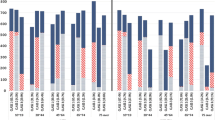Abstract
Intergenerational relations is a critical issue in South Africa's transition to democracy. Harsh apartheid laws as well as rapid urbanization have divided families and weakened the traditional mutual intergenerational support system. Earlier research indicated signs of alienation and conflict between the generations, particularly among urban black families (Ferreira et al., 1992). The paper reports on the role of everyday life in promoting solidarity in families and the well-being of members. A weekday time-use study was conducted among 300 multigeneration urban black households in two metropolitan areas. A time budget and questionnaire were administered to a high school pupil, a parent and a grandparent in each of the households (n900). Motivations underlying activities of the diary day were examined using the method developed by Elchardus and Glorieux (1992). Results suggest that generational norms exist regarding the allocation of time to social, physiological and personal gratification needs. Signs of alienation were found only among a minority of the oldest generation who gave a negative evaluation of their daily round of activities and reported depressed well-being. Results supported the idea that the urban black three-generation household represents a special case of family solidarity. Further research is needed to identify generational norms of time use in a wider range of South African family situations.
Similar content being viewed by others
References
Allen, K. R. and V., Chin-Sang: 1990, ‘A lifetime of work: the context and meanings of leisure for aging black women’, The Gerontologist 30(6), pp. 734–740.
Caldwell, J. C.: 1982, Theory of Fertility Decline (Academic Press, London).
Cattell, M. G.: 1990, ‘Models of old age among the Samia of Kenya: Family support of the elderly’, Journal of Cross-Cultural Gerontology 5, pp. 375–394.
Crandall, R.: 1979, ‘Social interaction, affect and leisure’, Journal of Leisure Research 11 (3), pp. 165–181.
Crawford, D. W. and G., Godbey: 1987, ‘Reconceptualising barriers to family leisure’, Leisure Science 9, pp. 119–127.
De, Grazia, S.: 1962, Of Time, Work and Leisure (Doubleday and Company, New York).
Deci, E. L. and R. M., Ryan: 1985, Intrinsic Motivation and Self-Determination in Human Behavior (Plenum Press, New York).
Duncan, D. J.: 1978, ‘Leisure types: factor analyses of leisure profiles’, Journal of Leisure Research 10(2), pp. 113–115.
Elchardus, M.: 1983, ‘De Ethiek van de Dualistische Conceptie van de Tijd’, Vrije Tijd en Samenleving 1 (4), pp. 343–373.
Elchardus, M.: 1990, Rationality and the specialization of meaning: sociological and utilitarian approaches of the allocation of time, paper presented at the XII World Congress of Sociology, Madrid, July 9–13.
Elchardus, M. and I., Glorieux: 1992, ‘Towards a semantic taxonomy: classifying activities on the basis of their meeting’, in ISTAT (ed.), Time Use Methodology: Toward Consensus (Istituto Nazionale di Statistica, Rome), pp. 247–276.
Ferreira, M., V., Møller, F. R., Prinsloo, and L. S., Gillis: 1992, Multidimensional Survey of Elderly South Africans, 1990–91: Key Research Findings (Human Sciences Research Council/University of Cape Town Centre for Gerontology, University of Cape Town, Cape Town, South Africa).
Glorieux, I.: 1986, ‘Alienation and the social meanings of time’, paper presented at the XIth World Congress of Sociology, New Delhi, Aug. 18–22.
Glorieux, I.: 1993, ‘Social interaction and the social meanings of action: a time budget approach’, Social Indicators Research 30(2–3), pp. 149–173.
Harvey, A. S.: 1990, ‘Time use studies for leisure analysis’, Social Indicators Research 23(4), pp. 309–336.
Harvey, A. S.: 1993, ‘Guidelines for time use data collection’, Social Indicators Research 30(2–3), pp. 197–228.
Losier, G. F., P. E., Bourque, and R. J., Vallerand: 1993, ‘A motivational model of leisure participation in the elderly’, Journal of Psychology 127(2), pp. 153–170.
Magi, L. M.: 1986, Black people's cognitions of natural recreation resources in the Natal north coastal region. Ph.D. thesis, University of Zululand, KwaDlangezwa, South Africa.
Møller, V. (ed.): 1991, Lost Generation Found: Black Youth at Leisure (Indicator South Africa Press, University of Natal, Durban, South Africa).
Møller, V.: 1992, ‘Spare time use and perceived well-being among black South African youth’, Social Indicators Research 26(4), pp. 309–315.
Møller, V.: 1994, ‘Intergenerational relations in a society in transition: A South African case study’, Ageing and Society 14, pp. 155–189.
Moss, M. S. and M. P., Lawton: 1982, ‘Time budgets of older people: a window on four lifestyles’, Journal of Gerontology 37(1), pp. 115–123.
Rubinstein, R. L.: 1986, ‘The construction of a day by elderly widowers’, International Aging and Human Development 23(3), pp. 161–173.
Samdahl, D. M. 1988, ‘A symbolic interactionist model of leisure: theory and empirical support’, Leisure Sciences 10, pp. 27–37.
Shaw, S. M.: 1985, ‘The meaning of leisure in everyday life, Leisure Sciences 7(1), pp. 1–24.
Steyn, A. F.: 1993, ‘Urban family structures in the Republic of South Africa’, South African Journal of Sociology 24(1), pp. 17–26.
Szalai, A. (ed.): 1972, The Use of Time (Mouton, The Hague).
Young, M. and T., Schuller: 1991, Life after Work (HarperCollins, London).
Author information
Authors and Affiliations
Rights and permissions
About this article
Cite this article
Møller, V. Intergenerational relations and time use in urban black South African households. Soc Indic Res 37, 303–332 (1996). https://doi.org/10.1007/BF00286236
Issue Date:
DOI: https://doi.org/10.1007/BF00286236



